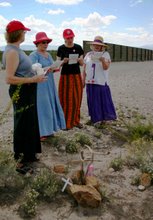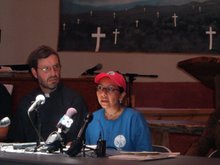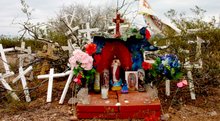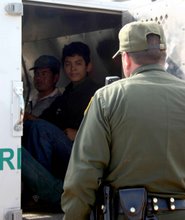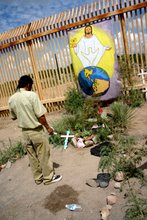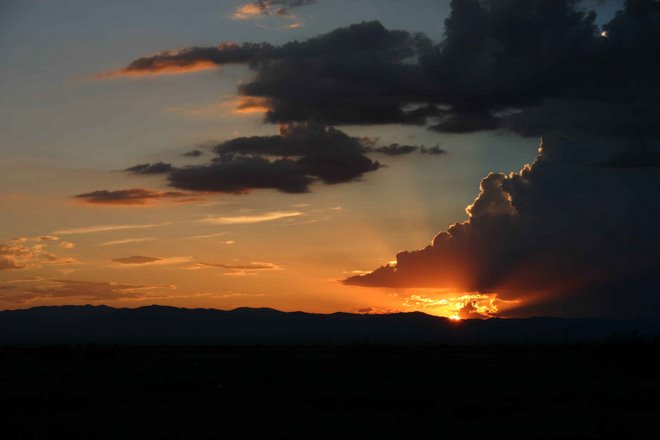
“For I was hungry and you gave me something to eat, I was thirsty and you gave me something to drink, I was a stranger and you invited me in, I needed clothes and you clothed me. …” Mathew 25:35-36 I have being working with the Arizona Borderlands, a Christian Peacemaker Team summer-long violence-reduction project based near Douglas, Ariz. We are in collaboration with No More Deaths, a coalition to protect the lives of those crossing the U.S.-Mexico border in the desert region of Arizona. The projects also look to promote humane and sustainable immigration policies in the Douglas region, where the biggest concentration of Border Patrol in the United States is currently located. Under the umbrella of No More Deaths, some of the organizations participating, along with CPT are Healing Our Borders, The Samaritans and Humane Borders, among many other groups, provide movable camps in the desert; provide and maintain water stations on both sides of the border; do Samaritan patrols, either driving, walking or biking and searches the desert for migrants in distress As I had lived my entire life in border towns — Brownsville and Matamoros — I felt privileged and excited to be able to participate in this project. I was, however, unprepared for what I experienced during my time in Douglas. At about 7 a.m. on Saturday, June 24, I was riding my bike around the camp in Douglas. After only going about one-fourth mile, I spotted a group of people who were walking. I kept riding my bike in their direction, not sure how many they were, perhaps three or four, but I wanted to make sure they were OK. When I got closer, I could sense that they were afraid, (wonder if their hearts were beating as fast as mine). I shouted, “Buenos días” and they did not respond. At about 30 feet I asked them if they had water and food, and if they all were OK. Then they stopped, and I introduced myself and told them about “No Mas Muertos” and what we are doing this summer to help people like them. There were five people in their group: three men — Mario, Miguel and Manuel, and two women — Areli and Ana. Ana was vomiting, with cramps in her legs and fingers, and headaches. Miguel had fallen the day before and had injured both knees and was in a lot of pain. Mario and the rest were starting to feel weak after three days and nights without food or water. When I asked them if they knew where they were or where they were going, Mario said, “Yes, we are getting close to Los Angeles,” pointing toward Douglas. They had been wandering in the desert in circles, like many do after they get separated from their guide or coyote, and they had lost track of time and direction. I invited them to go to the camp where they could rest, eat and drink some water. I told them I could not promise that the Border Patrol would not come, but they said that at this point, they were so tired, and although they wanted to continue, they all agreed that they needed some help. They came to the camp where we fed them, gave them some water, and then took them into our house where they took showers and changed their clothes. They told us their story, and how they got separated from a group of 16 people, and how five of the 16 were captured by the Border Patrol, just a few feet from were they were hiding. Ana and Areli told me how they had to hide a lot of the time (as they were afraid to be seen by the “Migra”) while walking, even if they needed to urinate. They always had to be flat on the ground, they said. It was humiliating for them, as they were the only two women, to have to take care of bodily necessities so close to the men. They were afraid that they would lose their way if they went as far as modesty required. Even the men admitted to the indignity of having to crawl along the ground, to have to grovel in their own filth. When they had recovered from their heat exhaustion and dehydration they started to think again of continuing on their way. I asked them if they were afraid. Looking at me with tear-filled eyes, Ana said: “Yes, but I have two kids back in Mexico, and I promised them a better life, even if in the end it costs me my own life, I will keep walking. I hope God will hear my prayers.” At the end of the day, Mario said: “Casi no tenemos dinero, pero quisieramos cooperar con ustedes, por lo bien que se han portado con nosotros.” (“We don’t have much money, but we would like to give something to your organizations, for all the help you have giving us.”) A week later I was in the airport, on my way back to Brownsville. I was wondering where those folks were, and how they were doing, when my telephone rang. It was Mario: “Hola, Elizabeth, estoy en Carolina del Norte. My family wants to talk to you, we are so grateful for what you all did for us.” It was so nice to hear from him. A couple of hours later, my phone rang again, this time it was Areli, who was already in Washington, with her brother. She too wanted me to know how grateful they were to the No Mas Muertos movement and how we saved them from the desert. The desert is a hard, lonely and depressing place. During the day, it is surely hotter than hell, and at night, sometimes colder than the worst kind of human selfishness. But it is also a place of extraordinary beauty, a Biblical place, of course! For many of us, the Arizona desert is where we can find that hungry one, that thirsty one, that naked one, that stranger. In the Arizona desert, we are offered a unique blessing in a time that otherwise knows only how to fear the stranger, a time when the stranger is suspected to bring not blessings, but terror to our homes. I think at the end, we all have a choice; I choose to be blessed by their presence.
